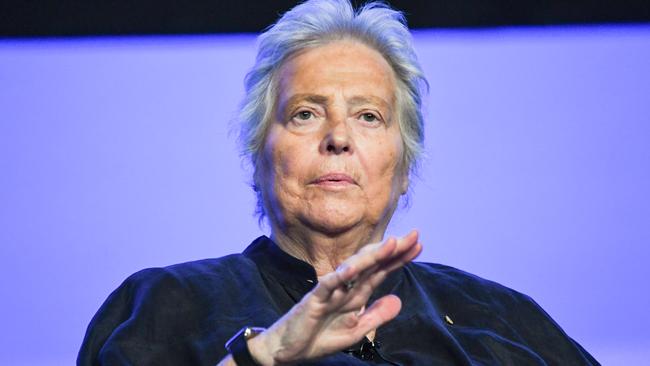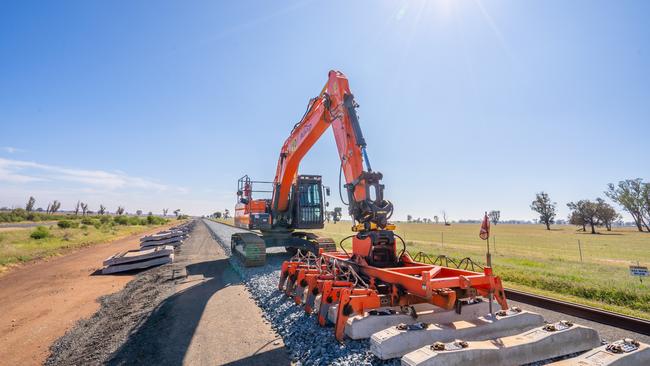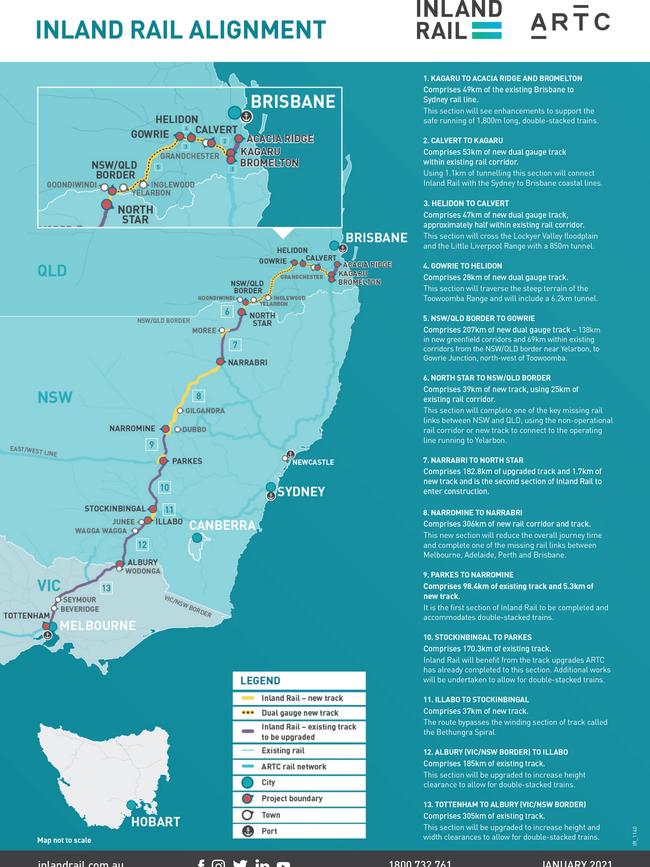Schott Review: Damning report finds Inland Rail project off track
The controversial project has blown the budget, while a major review into its governance can’t determine its cost and finish date.
The botched Inland Rail project has been plagued by poor governance and mismanagement, while its budget has nearly doubled to $30 billion in two years and it will no longer be finished this decade as scheduled, according to a scathing report.
The Schott Review also found “a major gap in skills” on the controversial project’s board caused by government ministers appointing members whose talents did not meet those “required to govern either freight rail operations or a major infrastructure project”.
It also discovered soil on the Coalition’s signature rail project was first turned before a decision was made with state governments about where the line should start or finish
And that decisions were ushered through using preliminary designs before the major infrastructure project was fully scoped out.
The Barnaby Joyce-led scheme was initially costed at about $9 billion when approved by the then Coalition government in the 2017-18 federal budget, however this was increased to $16.4 billion in a 2020 reassessment of the project.

The report stated that the latest cost estimate by the Australian Rail Track Corporation, which is completing the project on behalf of the government, has ballooned to $31.4 billion, “an astonishing estimated cost increase of almost double in just two years”.
Reasons provided in the review for the hike since 2020 include contractor overheads and approval process delays.
The federal government hand-picked former Energy Security Board chair and Sydney Water chief executive Kerry Schott last October to provide government clear guidance on why the Inland Rail project was running over budget and over time.
It promises a 1700km freight rail link between Melbourne and Brisbane once finished, running through regional Victoria, NSW and Queensland to complete the national rail network.
The plan involves upgrading 1100km of existing track and building 600km of new tracks reinforced to run double-stacked freight trains 24-hours a day.
Despite the negative findings, Federal Transport, Regional Development and Local Government Minister Catherine King today accepted all 19 of the review’s recommendations and said the government would continue with the project in a staged and “prudent and responsible way”.
“Dr Schott’s report is clear. Inland rail is behind schedule, over budget and requires a fundamental reset,” she said.
“Given the abysmal state the former government left the project in, we must take immediate action to get it back on track.
“When this Government can have faith that adequate environmental planning approvals are in place and there is sufficient certainty as to the scope and cost to build more of inland rail, we will do just that.”
The Albanese government will immediately brief an independent cost estimator and value engineer to fully scope the project and reassess costs and project delivery dates.
Dr Schott also reported that the complexities of the project were not appreciated by the former government either prior to commencing the project or during its delivery.
Potential additional costs attached to completing the project will be a concern for the Labor government when considering the Schott Review recommendations.
Dr Schott reported that the review had “failed” in assessing the extent of the projects’ problems due to “insufficient certainty about the completion date and the final cost to have confidence in the current estimates”.
The report found the 2020 full project completion date of 2027 would not be met after the ARTC revealed it could not be finished before the early 2030s.
“I remain deeply worried about the level of scope maturity across the project as a whole and as a result the future impact on project cost and completion time estimates remains difficult to ascertain,” Dr Schott wrote.

The paper said that while some sections of track in NSW and Victoria were well-advanced, sections in Queensland remained in infancy.
“Of course, all infrastructure projects at present face challenges. Contributing to delays are skill shortages and supply chain issues for materials,” the report said.
New regulatory conditions related to flooding and climate change resilience are also delaying approvals.
Calls for improved risk management, staging and approval processes were among the reports other recommendations.
It also advised on governance issues and suggested that the board “gain skills particularly relevant to rail operations”, including the maintenance of the existing track and how rail interacts with other transport modes.
“While Ministers, as shareholder representatives, have every right to appoint whom they choose as directors,” it said.
“They also have an obligation to ensure that the business is governed properly and this means paying attention to the skills that are needed. Shareholder Ministers of the former government did not meet that obligation.”
Dr Schott also raised questions about the ARTC’s future financial position, noting “revenue over future decades may decrease as coal exports decline”.
The review also revealed that, while state governments and rail freight operators are keen to settle the end points of the route, “somewhat surprisingly” the project commenced delivery without knowing at which intermodal station it would start or finish – mainly due to the expense and local resistance that building or expanding freight rail lines through suburbs and cities can cause.
Ms King said the government will follow Dr Schott’s recommendation to make Beveridge in Victoria and Ebenezer in Queensland as the end points for double stacked freight.
The report said the project promised to ease congestion on major highways between east coast capital cities, increase the resilience of the national freight network, decrease shipment times, to boost regional exports, particularly grains, and reduce emissions by an estimated 750,000 tonnes a year by 2050.
Meanwhile, landholders also raised a raft of concerns prior to the review being announced, including land value disagreements, fencing standards, contractors entering properties without appointments and difficulties dealing with the ARTC.
However, NSW Farmers announced a truce with the builder of the east coast’s Inland Rail project three weeks ago after years of bitter disputes.
More Coverage




